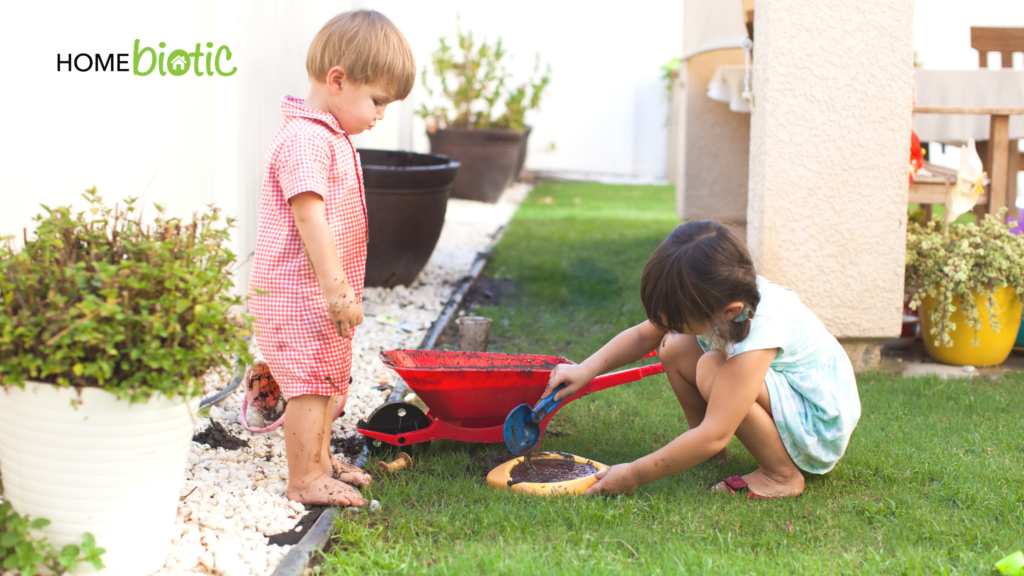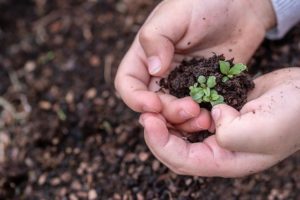
Modern society tends to favor clean, perfectly kept children, but do dirty kids make healthier kids? There’s been some talk recently about the benefits of kids playing in dirt and that it may actually benefit their health. The discussion was sparked by research that showed how kids brought up on farms had healthier immune systems than those that had no exposure. It seems that exposure to farm animals, and the dust and dirt that comes with them, actually helps protect and build kids immune systems1.
It seems that exposure to farm animals, and the dust and dirt that comes with them, actually helps protect and build kids immune systems Share on XIt makes sense that parents might then ask, “So, does this mean I should let my kids get covered in dirt or even eat dirt?” The question is valid and perhaps meant with some playful sarcasm; the answer, though, may surprise you. While it may be absurd to have your kids make a lunch out of dirt, having some healthy exposure to it may be a good thing.
 WHAT IS HEALTHY DIRT?
WHAT IS HEALTHY DIRT?When we speak of dirt, we’re really talking about outside soil. Many parents may get concerned about their kid’s health when playing in dirt. What they don’t know is that it contains some specific ingredients that can be healthy for us – microbes.
Outside soil contains microbes that are necessary for the health and wellbeing of all living things that depend on the soil for survival. The main essential microbes to consider are bacteria and fungi, and healthy soil requires balanced and diverse species of these microbes. Human beings, and the environments we live in depend on healthy soil to live well2,3.
The interaction of all the microbes in the outside soil is called a microbiome. It consists of microbes that co-exist as well as microbes that help or harm each other. Bacteria and fungi compete, help, and eat each other in a quest to find balance4,5.
 Balance is essential because a microbiome that lacks balance will have microbes that have either decreased in numbers or and have over-grown. An unbalanced microbiome is called dysbiosis and can cause a range of health or environmental issues5,6.
Balance is essential because a microbiome that lacks balance will have microbes that have either decreased in numbers or and have over-grown. An unbalanced microbiome is called dysbiosis and can cause a range of health or environmental issues5,6.
We also have a similar internal microbiome in our digestive tract, skin, and reproductive organs. We know that the more diverse the microbiome is, the more balanced it is, and the healthier we are as a result5.
All living things are connected and need to live in balance. Although that may sound like a new age cliche, it happens to be a scientific fact. Studies show that external soil also affects the microbiome in our homes and within our bodies6,7. In a sense, microbes are always searching for a way to balance things out and survive.
Microbes within the home reflect the individuals living there as well as plants and food choices. Also, soil-based microbes outside of the house can be found inside depending on the movement of inhabitants and cleaning practices7,8,9.
What experts now understand is that the presence of diverse soil-based microbes inside the home can have a balancing effect against the causes of musty odors 7,8,9. Again, this is the essence of a healthy balance, which also parallels what we know about our internal microbiome. The more diverse our microbes are in our guts, the better our immune system and overall health will be.

None of us want a pile of dirt in our homes nor do we want our kids to eat dirt, but we can begin to shift our ideas and take actions to help include soil-based microbes in our home. By making some changes, we can actually improve the overall health and balance in our home microbiome.
Here are some tips on how to promote a healthy exposure to soil microbes in your home:
This doesn’t mean you should get a dog if you don’t want one or can’t care for it properly. But if you have one, then you’ve already taken a step in the right direction. Research has shown that homes with dogs have more diverse microbes, and many of them are soil-based7,9.
A good exposure to the outdoors is helpful in so many ways. It promotes exercise, knowledge of nature, vitamin D exposure, and relaxation to name a few. Also, having your kids play outside can help introduce soil-based microbes into the home. Of course, you wouldn’t want to encourage them to bring in piles of it, but natural outdoor play may bring in small amounts that can be a help.
While we’re talking about kids, let’s not forget that adults need time in the outdoors for their health and stress relief as well. The more we can enjoy nature, the more we want to protect it and learn about it. And of course, we can also improve the soil-based microbiome in our homes by spending time outside.
Research has shown that household areas cleaned with harsh detergents can obliterate the soil-based microbes. This may cause mold and bacteria to grow in more significant numbers than what you would want7,10. In fact, even environmentally friendly products can also cause trouble if used in excess.
Research has shown that household areas cleaned with harsh detergents can obliterate the soil-based microbes. This may cause mold and bacteria to grow in more significant numbers than what you would want Share on XThis product is natural, easy to apply, and is the most effective solution since you get all the benefits of soil microbes without bringing the outside in.
 CONCLUSION
CONCLUSIONSo, should your kids eat dirt? Well, not exactly, but there’s a definite benefit for encouraging exposure to dirt for sure. By allowing a relationship to happen between soil-based microbes and your home, you can help improve the microbiome in the place you live, eat, sleep, and interact with your family.
There are several ways you can promote and encourage exposure to soil-based microbes. Having a dog and playing outside with your kids is a fun and easy way to bring in the soil without a lot of dirt. Also, being mindful of cleaning products and the frequency of cleaning can help ensure a balance. Lastly, using Homebiotic Probiotic Spray can quickly bring the benefits of soil-based microbes into your home, without the dirt.
1.https://err.ersjournals.com/content/27/148/170137
2.https://www.sciencedirect.com/science/article/pii/S0360132316303419#bib5
3.https://royalsocietypublishing.org/doi/full/10.1098/rspb.2015.1139
4.https://escholarship.org/content/qt68c2j665/qt68c2j665.pdf
5.https://www.npr.org/sections/thesalt/2018/01/29/579747917/the-cheese-does-not-stand-alone-how-fungi-and-bacteria-team-up-for-a-tastier-rin
7.https://draxe.com/health/gut-health/microbiome/
8.https://journals.plos.org/plosone/article?id=10.1371/journal.pone.0064133
9.https://www.sciencedirect.com/science/article/abs/pii/S0966842X1630021X
10.https://www.ncbi.nlm.nih.gov/pubmed/25707017
11.https://www.ncbi.nlm.nih.gov/pmc/articles/PMC2631814/

Gillian is a former nurse and joined the Homebiotic team as a researcher & science writer. She loves traveling the world and currently lives in Colombia.